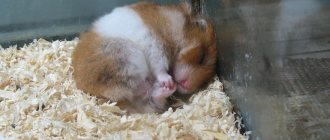About vaccination
Any owner who raises rabbits commercially or keeps ornamental animals as pets should understand that all types of rabbits require vaccination. These animals are susceptible to various diseases, including diseases that pose a threat to humans. Of course, it is wiser to prevent diseases than to treat them later, especially since some of them cannot be treated at all.
There are a number of vital vaccinations for rabbits.
Vaccines are designed to produce immunity in an animal against a specific pathogen. Sometimes rabbits may develop symptoms after vaccination, but the illness is mild and the risk of contracting the same infection in the future is minimal.
Microbes of various infections are transmitted to rabbits through contact with each other and other animals, through insect bites, while walking, eating food and drinking water. Therefore, even those pets who spend their entire lives in an apartment with caring owners are not immune from diseases.
Rabbits during pregnancy can also be vaccinated with any vaccine at different times (inactivated polyvalent drugs work better), but it is better to immunize them in advance. The only contraindication is the lactation period, since vaccination of the female can negatively affect the health of the newborn young. For breeding rabbits, the necessary vaccinations must be completed several weeks before mating. This ensures the animals' immunity to dangerous diseases and protects future rabbits.
What diseases are rabbits vaccinated against?
There are 3 mandatory injections, without which rabbits are not allowed to participate in exhibitions, competitions, transportation across the border, or mating. In addition, the chance of survival of unvaccinated babies is low.
Rabbits receive their mother's immunity at birth, absorbing immune cells with milk. After feeding, they remain defenseless against the outside world and infections. Often it is the immature young that die out.
The most dangerous disease is rabbit viral hemorrhagic disease (RVHD) . The virus appeared in the 1980s, presumably from the PRC. It is transmitted from rabbit to rabbit through contact, use of the same bedding, cages, bowls, even when walking on the same soil. The infection cannot be transmitted to humans.
The fur of infected rabbits is also dangerous; it is aired out for 3-4 months before sale (and demand and price drop by 2-3 times). Symptoms: mucus from the nose, lack of appetite, high fever, convulsions.
The most dangerous disease is rabbit viral hemorrhagic disease (RVHD)
Myxomatosis is an infection transmitted by contact by mosquitoes. Expressed by swelling of the mucous membranes, purulent conjunctivitis, painful neoplasms, tumors, blisters, crusts; secondary development of sexual problems.
It is transmitted and develops within a week. Unlike VGBK, cure is possible, but with a lightning-fast reaction to the first symptoms.
Myxomatosis
Rabies is a rare disease among rabbits, but it has been actively gaining popularity in recent years. Vaccination is mandatory for transporting pets.
The virus is dangerous for humans; a sick animal cannot be saved. Manifested by excessive salivation, aggressive behavior, epilepsy, photophobia.
Rabies
Signs of myxomatosis
The disease is always accompanied by the formation of nodules or red spots on the surface of the animal’s ears, near the eye area, and other parts of the body. There are two forms of myxomatosis:
- Edema. Accompanied by a high temperature of up to 41 degrees, which persists until the first signs appear. The animal develops conjunctivitis: severe redness of the eyes followed by the release of purulent secretion. A severe runny nose occurs, tumors are observed throughout the body, reaching a diameter of 3–4 cm. Rabbit myxomatosis lasts 4–10 days, in some cases – a month. Pneumonia, which leads to death, poses a danger to the life of the animal.
- Nodular. It proceeds in a smoking mode for the rabbit, approximately half of the individuals survive. It is characterized by the formation of dense, numerous tumors with a diameter of 0.5–2 cm without a rise in temperature. For two weeks, the rabbit fights the infection, after which, in surviving animals, the tumors die, wound healing lasts for 2 - 4 weeks.
- Rabbits that have recovered from the disease develop immunity to myxomatosis, and infection with the disease becomes not scary for most individuals.
Optional vaccines
The presence of these vaccinations is not stipulated in the charters of nurseries, organizations, and agricultural farms. But in order to avoid an epidemic among young rabbits, it is better to protect yourself with additional procedures.
Veterinarians recommend injections for the following diseases:
- Salmonellosis . A dangerous virus for all mammals, even humans. It is transmitted by contact through bedding, bowls, shoes, and soil. The infection kills the tissues of the pulmonary apparatus and digestive organs, manifesting itself in the form of diarrhea, acute poisoning, and nasal discharge.
- Listeriosis. An incurable disease characteristic of pregnant rabbits and young animals. Affects the central nervous system and is spread by rodents. Leads to paralysis, miscarriages, and stillbirths. Transmitted to humans.
- Pasteurellosis. The infection develops in the bodies of dead animals and is transmitted through the air through contaminated food. Causes redness of the mucous membranes, high fever, diarrhea, nasal discharge, and difficulty breathing.
Be sure to read:
The birth of rabbits and caring for them, what to feed a nursing rabbit
Salmonellosis
Attention! Although vaccinations for these diseases are not required, this does not make them any less contagious or dangerous. Mortality rates from salmonellosis are 90%.
Pasteurellosis
Warning: dangerous virus
Since we are telling you about what and when vaccinations to give a rabbit, we are obliged to dwell in more detail on myxomatosis. This is one of the most dangerous viruses, and without immunization the baby rabbit will die in 80-100% of cases. The disease is transmitted by mosquitoes. Above we told you how best to protect yourself from them.
But it is still necessary to vaccinate your rabbit against myxomatosis. The vaccine is administered to animals of all ages and in all areas, regardless of their reliability. Such reinsurance is necessary, because it only takes one individual to become infected with the virus, and an epidemic will begin on the farm in a matter of days.
To protect pets from the virus, they are injected with the drug “RIBBYVAK B”. This is a monovalent associated vaccine that provides immunity for 12 months. But polyvalent drugs also contain an antivirus for myxomatosis. For more information about their action and technology of application, read the article “Use of associated vaccine for rabbits.”
Vaccination scheme
Depending on the age, procedures for vaccination and revaccination of rabbits are carried out alternately. For babies who have not gained the required weight, vaccination is postponed. WITH
The cost at the clinic is 200-400 rubles.
| Age | Vaccine | Route of administration and dose |
| 28-30 days | Myxomatosis | 1 cube intramuscularly |
| 1.5 months | VGBK | 0.5 cc intramuscularly |
| 3 months | Solikoks (against coccidiosis) | Per 1 kg 0.4 ml with food (2 days in a row) |
| 4 months (and every six months) | Myxomatosis (revaccine) | 1 cube intramuscularly |
| 4.5 months (and every six months) | VGBK (revaccine) | 0.5 cc intramuscularly |
| 6-7 months (and annually) | Rabies | As recommended by your veterinarian |
Reinsurance or a rabbit ticket for traveling abroad
Since we have raised the issue of vaccinations for rabbits and when to do them, we cannot fail to note the procedure for rabies vaccination. Although this serum is not included in the list of mandatory drugs administered to rabbits, it is better to play it safe and give the animal an injection.
Rabbits are vaccinated against rabies once in their entire life and at any age.
Many breeders neglect vaccinating against rabies, believing that such vaccinations are not necessary for decorative rabbits. On the one hand, they are right, since there is practically no risk of contracting this disease by animals growing in greenhouse conditions.
On the other hand, it is not equal to zero. In addition, it is prohibited to export a rabbit that has not been vaccinated against rabies from the country. If you are raising animals for exhibitions, then you should definitely take care of such vaccination so as not to create additional hassle in the future.
Vaccines for rabbits
All funds are divided into two types, determined by the presence of active or dead strains of the virus. There are live vaccines - they contain fragments of an active infection, to which the body reacts violently, but quickly builds protection.
The second type is inactivated. They differ in composition: the strains are dead, the reaction in rabbits is hidden, immunity takes longer to establish, but also lasts longer.
Mono-vaccines
At the moment, they are considered ineffective, they consist of strains of one virus, which is why the animal has to be pricked several times. At first glance, the drugs seem cheaper than polyvaccines, but this does not take into account the purchase of additional mixtures. The technology of use differs in that the solvent is often water rather than a solution.
Be sure to read:
How to determine the sex of a rabbit: external differences, sexual characteristics, behavior
Complex vaccines
Vaccination with preparations containing strains of more than one virus is more profitable. Such vaccines are divided into bivalent (2 infections) and polyvalent (over 3 viruses).
In Russia, the first type is popular, providing protection against VGBK, myxomatosis:
- “Lapimun Hemix” (manufacturer – Ukraine);
- "Rabbiwak V" (domestic production);
- "Pestorin Mormix" (Poland);
- "Nobivak Mixo" (Holland);
Important! Additional vaccines are also complex. The drug "OKZ" is often used for salmonellosis, klebsiosis, and colibacillosis.
Although several diseases are more difficult to control, associated vaccinations are more effective. Firstly, the animal does not need to endure several injections or experience stress.
Secondly, the possibility of side effects is half that of a single-component medicine.
Necessity or waste of money
Let's figure out whether rabbits need vaccinations, and when you can do without them. It is an axiom that it is mandatory to vaccinate animals, and you just have to remember it. Experienced rabbit breeders have no doubt about this, but for beginners we will explain.
There are two reasons why it is necessary to vaccinate regular (meat) and decorative rabbits. Firstly, even animals kept in perfect cleanliness and fed with high-quality feed can get sick, as they are very sensitive and whimsical.
Secondly, a vaccine for rabbits is the only chance to save an animal’s life if it becomes infected. And all because most diseases for representatives of the hare family are fatal, and there is no cure for them. So all that remains for rabbit breeders is to take care of the animals and try to anticipate the appearance of infection through timely vaccination.
Preparing for vaccination
The drugs do not work on already infected rabbits; animals must be absolutely healthy before vaccination. To make sure of this, the pets’ basal body temperature is measured every day for a week (the norm is no higher than 39.5 degrees).
A healthy rabbit has a good appetite. Discharge from the nose, diarrhea, painful appearance, and shortness of breath may alert you.
Within 2 weeks, rabbits are dewormed by administering anthelmintic drugs. These are suspensions or compressed tablets. If you have no experience with vaccination, it is better to go to a veterinary clinic, consult with a specialist, and choose the right dose based on weight.
Table of veterinary measures on a rabbit farm
As promised at the beginning of the article, we tell you when to vaccinate against the rabbit virus, against what diseases and what is the dosage of the drug. Let’s immediately make a reservation that we will tell you the general picture of immunization and give examples of monovalent sera.
The table shows the vaccination scheme for rabbits without taking into account optional vaccinations, since we discussed them in detail above.
We have given only one version of the immunization schedule on a rabbit farm. But each breeder must have his own calendar, where all vaccinations given will be noted. This will allow you to administer the drug in a timely manner and prevent the occurrence of diseases. Over time, you will understand how important it is to keep such records.
How to vaccinate rabbits yourself
Experienced breeders prefer to vaccinate their pets themselves; it is cheaper, and the rabbit does not need to be taken to the clinic (especially when a whole herd is being vaccinated). Before the procedure, you need to take care of the drug itself. Purchase it from veterinary pharmacies or clinics.
It is important to ask the seller for a certificate and check the expiration date.
Vaccinate strictly according to instructions. The dry powder is diluted (solvent - water) to make 0.5 ml. The needle of the insulin syringe is wiped with alcohol (used once), as is the puncture site.
It is better to inject into the thigh - intramuscularly, but subcutaneously is allowed - into the fold on the withers (the skin is pulled back). A specific place is not selected; it is impossible to harm the animal in this way. The required dose is injected and the area is wiped with alcohol.
Attention! An open drug is used within 3 hours, after which the expiration date expires and the vials are disposed of.
Quarantine – 14 days. At this time, it is important to limit contact with unvaccinated individuals, reduce the risks of mosquito bites, and the influence of the external environment (cold, heat).
To improve the functioning of the immune system, vitamin supplements, immunostimulants, fish oil, pumpkin, sprouted grains, and rowan are introduced.
Be sure to read:
How to understand that a rabbit is pregnant and what to do then
If you plan to transport your pet across the border or participate in exhibitions, 20 days must pass after the last procedure, but no more than six months (for mandatory vaccines). The schedule is tracked using the veterinary passport.
Why is it better to entrust it to a specialist?
- A veterinarian will be able to conduct a qualified examination of the animal to determine its health status, and, if necessary, prescribe additional examinations and tests.
- The specialist is responsible for the quality and expiration dates of the drugs he uses (if in doubt, you can check this, but it is better to seek help from doctors who do not raise doubts).
- An allergic reaction can occur even if the vaccine is administered by a professional. Why then contact him? Because it is a specialist who can promptly identify the first signs of its manifestation and provide qualified assistance, preventing the development of negative consequences and the possible death of the animal.
- The doctor, due to the nature of his activity, knows better the epizootic situation in the region and can suggest which vaccines are best to use.
This is especially true for owners of domestic decorative rabbits and beginner rabbit breeders.
Vaccinations for pregnant rabbits
Doctors recommend vaccinating the female 2 weeks before mating. This way she will develop immunity to certain viruses, pass some of it on to future offspring, and the young will be born primarily protected. But vaccination during pregnancy in the absence of allergies is well tolerated.
Important! Vaccination is carried out at any stage of a rabbit’s life; the procedure is undesirable only during lactation (milk may turn sour, disappear or run out).
Is there a risk and what does it mean?
Even if it is minimal, there is still a risk to the animal’s health. In addition to the above factors, it may be associated with the individual sensitivity of the body and can manifest itself in the development of allergic reactions, up to the development of anaphylactic shock and, in the case of failure to provide qualified assistance, death.
In addition, if the vaccination conditions are not followed, the following may occur:
- Insufficient development of immunity to the preventable disease (decreased duration of the vaccine) or even its complete absence.
- In some cases, instead of developing immunity to the disease, the animal may get sick (disease during the incubation period, incorrect dosage, failure to comply with revaccination deadlines, an overly weakened body).
Side effects from vaccination
Due to the partial death of rabbits after vaccination, owners refuse to vaccinate animals in order to avoid the extinction of the herd.
Such a reaction is possible if an uncertified vaccine is purchased, the expiration date expires, the ampoules are depressurized, the drug is improperly stored, or due to the fault of the owner:
- incorrect dosage selection;
- non-sterile devices;
- lack of preparation before the procedure;
- administering the mixture to sick pets;
- presence of mosquitoes, ectoparasites;
- delay in revaccination.
After correct mandatory vaccination, there are no side symptoms, unless the eared animals have an allergy or hypersensitivity to the drugs.
Within 48 hours after the injection, swelling, swelling, and enlarged lymph nodes are observed. You need to monitor the condition of the rabbits for 15-20 days; if other effects occur, contact a veterinarian.
Possible complications.
Animals usually tolerate vaccination well, without complications, and the stress caused by the injection usually completely disappears after 2-3 hours. However, in some cases, a rabbit may be allergic to the vaccine and show symptoms 15-20 minutes after vaccination.
The main symptoms of an allergic reaction include:
- redness of the mucous membranes;
- rash; excessive salivation;
- drowsiness;
- dyspnea;
- loss of consciousness.
If after vaccination one or more of the above signs are observed, the animal is immediately injected intramuscularly with 0.3 ml of the antihistamine Suprastin or Diphenhydramine. To maintain cardiac function, 0.3 ml of sulfocammofocaine and 20 ml of saline are administered subcutaneously.
Important nuances
Pregnant rabbits not only can, but also need to be vaccinated - it is completely safe. But during the lactation period, it is recommended to refrain from any injections and strong antibiotics, since their components, along with the milk, will reach the babies.
It is recommended to start vaccinating your rabbit at 1.5 months (with the exception of vaccines developed specifically for young animals). But in farms recognized as unfavorable, and in the absence of mother’s milk, babies are immunized from the age of thirty days.
There is no seasonal framework for vaccination. But rabbit breeders prefer to introduce serums in the fall and spring. There are also exceptional cases, for example, mosquito control. In winter, these bloodsuckers do not bother rabbits, so there is no need to get rid of them.











